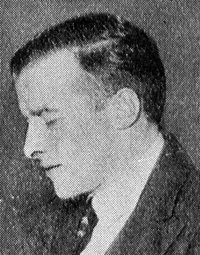
|
|
|
London 1927
From the Scottish Chess Association Bulletin, No. 12, October-December 1963.
Mr Ian Hamilton of the Wardie Residents' Club and President of the Edinburgh Chess League has given us the opportunity to study the brochure of the London Congress held in July 1927. The Congress provided for the first full scale international team tournament as well as individual competitions. Sixteen teams of four, the USA and Russia were the only important chess countries not there, competed in a fifteen round tournament. The British team was Atkins, Mitchell [sic. Michell], Sir Geo. Thomas, Yates and Spenser [sic. Spencer], a useful side by any standards and it finished in third place behind Hungary and Denmark.
 |
The Scots competing in the individual events, of which there were ten, each of 12 players, were C. Wardhaugh, the Scottish Champion of 1915, in the Major; Miss Hutchison-Sirling (Edinburgh) in the Women's, which Miss Vera Menchik won convincingly; Mrs J. Brockett (Glasgow); Miss S.V.A. Malcolm and Miss M.C. Forbes (Edinburgh); G.D. Hutton (Dunbar); and last, but with by no means the least honour, Ian Hamilton who won the Third Class tournament, one point ahead of his nearest opponent. He is chivalrous now, but he must have been even more so in his twenties for the only points he dropped were to three of the four ladies in his competition. The fourth, it is of interest to note, was Miss menchik's sister, Olga.Mr Hamilton has written these notes of his impression of the Congress.
"Have you played any of the Tarrasch Defences, followed Grünfeld's line in the QGD, gone hyper-M with the Reti-Opening, played for the Maroczy Bind in the Sicilian or schemed to spring Monticelli's Trap in the Queen's Indian? The originators of these variations played in the team tournament together with the fledgeling Euwe - "The promising young Dutch player", the titled Italians Count Saconi and the Marquis Rosselli del Turco, Koltanowski, whose blindfold successes lay in the future and the eternal Mieses, then in the German team. The most overpowering and exuberant personality was Boris Kostich, the itinerant Yugoslav Master ("I play ze Evans Gambit as a tribute to British chess"), who popped up in the news in Indonesia one month and in Indiana the next. But my clearest memory is of the debonair Vladimir Vukovic, always in full evening dress and faultlessly groomed.
Most evenings there were lightning turnaments where one could, with luck, be drawn against Masters. My collection was in the minor range - Havasi of Hungary, Tschepurnoff and Heilimo of Finland and Dr Kalabar of Yugoslavia, but thanks to the younger Miss Menchik I had the privilege of playing three games in an afternoon with the redoubtable Ladies' World Champion - Vera. On the lighter side, a gentleman who was an assiduous spectator let it be known to al that he was on a Secret Service Mission with the task of picking up any scraps of information let fall by the foreign visitors. This daily ration of M.I. 5'ism reached a peak when a few of his many confidants were invited to an office which he explained was used as business cover and there he paraded in a Chinese gown and Mandarin cap!
In conclusion I should perhaps say regarding the note above that it wasn't chivalry, it was carelessness."